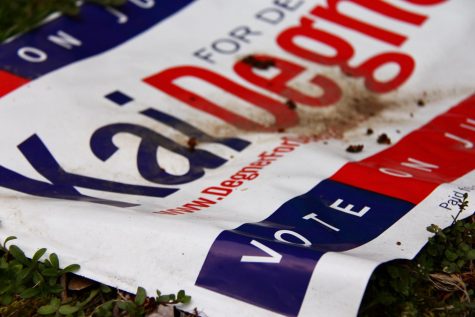Analysis: Is There More to Proposition 30 Than Meets the Eye?
Often, propositions have confusing language, with arguments on both sides contradicting each other, so El Vaquero reporter Brittany Klintworth seeks to break down the confusion
Proposition 30 pushes for zero-emission vehicles (ZEVs), and preventing and fighting wildfires in an ongoing effort to tackle climate change and clean the air, which is to be funded by taxing only those who make $2 million in personal income. It looks stellar on paper, so why is Gov. Gavin Newsom, a supporter of electric vehicles (EVs), saying no to Prop. 30?

Newsom believes that Prop. 30 is a special interest carve-out devised by the ridesharing service Lyft. The California Air Resources Board will require rideshare companies to go 90% zero emission by 2030, so Prop. 30 will benefit Lyft directly. In addition, Lyft has donated millions of dollars to support Prop. 30.
Other opposition to Prop. 30 comes from the California Teachers Association, the Republican Party of California, and the California Small Business Association. Newsom and these groups believe Prop. 30 is unnecessary because the state has already pledged $10 billion for electric vehicles and the infrastructure required to support them.
Another prominent concern these groups have is higher taxes, which they claim will raise costs for every Californian. Proposition 30 does specifically communicate that it will only tax those making over $2 million in personal income.
An additional financial concern opposing groups have is that Prop. 30 doesn’t guarantee that low-income families who are already struggling will be able to buy a ZEV. Accessibility is paramount when making decisions that will affect everyone.
Groups such as Lyft, the California Democratic Party, and the Union of Concerned Scientists are singing a very different tune regarding prop 30.
Supporters of the proposition believe the climate crisis is dire, and the $10 billion thus far pledged for electric vehicles isn’t enough. The greenhouse gas carbon dioxide emitted from gas vehicles causes the planet to trap heat; however, too much carbon dioxide is being released and heating the Earth to the point that it is a problem.
An argument championing Prop. 30 is that it will end up saving consumers money on gas and car maintenance. Prop. 30 appears to have accounted for low-income communities. The proposition states it will supply financial assistance and direct rebates to make sure that any family, regardless of their financial status, can afford an EV. In a further effort to include low- and middle-income Californians, Prop. 30 will also expand charging stations for EVs in apartments and multi-family homes.
Lastly, Proposition 30 plans to allocate funds to programs for wildfire prevention and suppression. A counter-argument from the opposing party is that the state’s budget surplus can be used for these programs, so the proposition is excessive.
Brittany Klintworth can be reached at [email protected].
